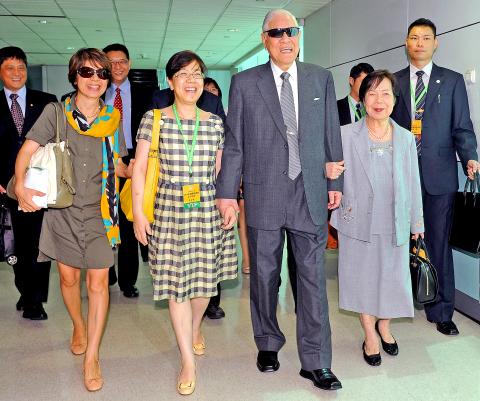Former president Lee Teng-hui (李登輝) yesterday departed for Japan on a one-week private visit, his sixth such trip in 14 years.
Lee said prior to his departure that he would use the opportunity to discuss with Japanese experts issues related to cancer treatment, solar photovoltaic energy and livestock breeding.
Accompanied by his wife, Tseng Wen-hui (曾文惠), and their two daughters, Anna Lee (李安娜) and Annie Lee (李安妮), the 91-year-old landed at Osaka airport.

Photo: Chu Pei-hsiung, Taipei Times
According to the Friends of Lee Teng-hui Association, which helped organize the trip, Lee will deliver a speech in Osaka today, before traveling to Tokyo on Sunday, where he is scheduled to give another speech and tour renewable energy facilities.
His last stop is in Hokkaido on Tuesday, where Lee is scheduled to visit livestock breeding and dairy businesses, the association said.
Lee, the nation’s first democratically elected president and an outspoken supporter of Taiwanese independence, last visited Japan in September 2009.
The current tour is Lee’s sixth visit to Japan since May 2000, when he retired after having been in office for 12 years.
The first Taiwan-born president, Lee spent 22 years under Japanese rule — from when he was born in 1923 until the period ended in 1945 — and has expressed affection for the nation’s former colonial ruler.

A preclearance service to facilitate entry for people traveling to select airports in Japan would be available from Thursday next week to Feb. 25 at Taiwan Taoyuan International Airport, Taoyuan International Airport Corp (TIAC) said on Tuesday. The service was first made available to Taiwanese travelers throughout the winter vacation of 2024 and during the Lunar New Year holiday. In addition to flights to the Japanese cities of Hakodate, Asahikawa, Akita, Sendai, Niigata, Okayama, Takamatsu, Kumamoto and Kagoshima, the service would be available to travelers to Kobe and Oita. The service can be accessed by passengers of 15 flight routes operated by

MORE FALL: An investigation into one of Xi’s key cronies, part of a broader ‘anti-corruption’ drive, indicates that he might have a deep distrust in the military, an expert said China’s latest military purge underscores systemic risks in its shift from collective leadership to sole rule under Chinese President Xi Jinping (習近平), and could disrupt its chain of command and military capabilities, a national security official said yesterday. If decisionmaking within the Chinese Communist Party has become “irrational” under one-man rule, the Taiwan Strait and the regional situation must be approached with extreme caution, given unforeseen risks, they added. The anonymous official made the remarks as China’s Central Military Commission Vice Chairman Zhang Youxia (張又俠) and Joint Staff Department Chief of Staff Liu Zhenli (劉振立) were reportedly being investigated for suspected “serious

ENHANCING EFFICIENCY: The apron can accommodate 16 airplanes overnight at Taoyuan airport while work on the third runway continues, the transport minister said A new temporary overnight parking apron at Taiwan Taoyuan International Airport is to start operating on Friday next week to boost operational efficiency while the third runway is being constructed, the Ministry of Transportation and Communications said yesterday. The apron — one of the crucial projects in the construction of the third runway — can accommodate 16 aircraft overnight at the nation’s largest international airport, Minister of Transportation and Communications Chen Shih-kai (陳世凱) told reporters while inspecting the new facility yesterday morning. Aside from providing the airport operator with greater flexibility in aircraft parking during the third runway construction,

American climber Alex Honnold is to attempt a free climb of Taipei 101 today at 9am, with traffic closures around the skyscraper. To accommodate the climb attempt and filming, the Taipei Department of Transportation said traffic controls would be enforced around the Taipei 101 area. If weather conditions delay the climb, the restrictions would be pushed back to tomorrow. Traffic controls would be in place today from 7am to 11am around the Taipei 101 area, the department said. Songzhi Road would be fully closed in both directions between Songlian Road and Xinyi Road Sec 5, it said, adding that bidirectional traffic controls would